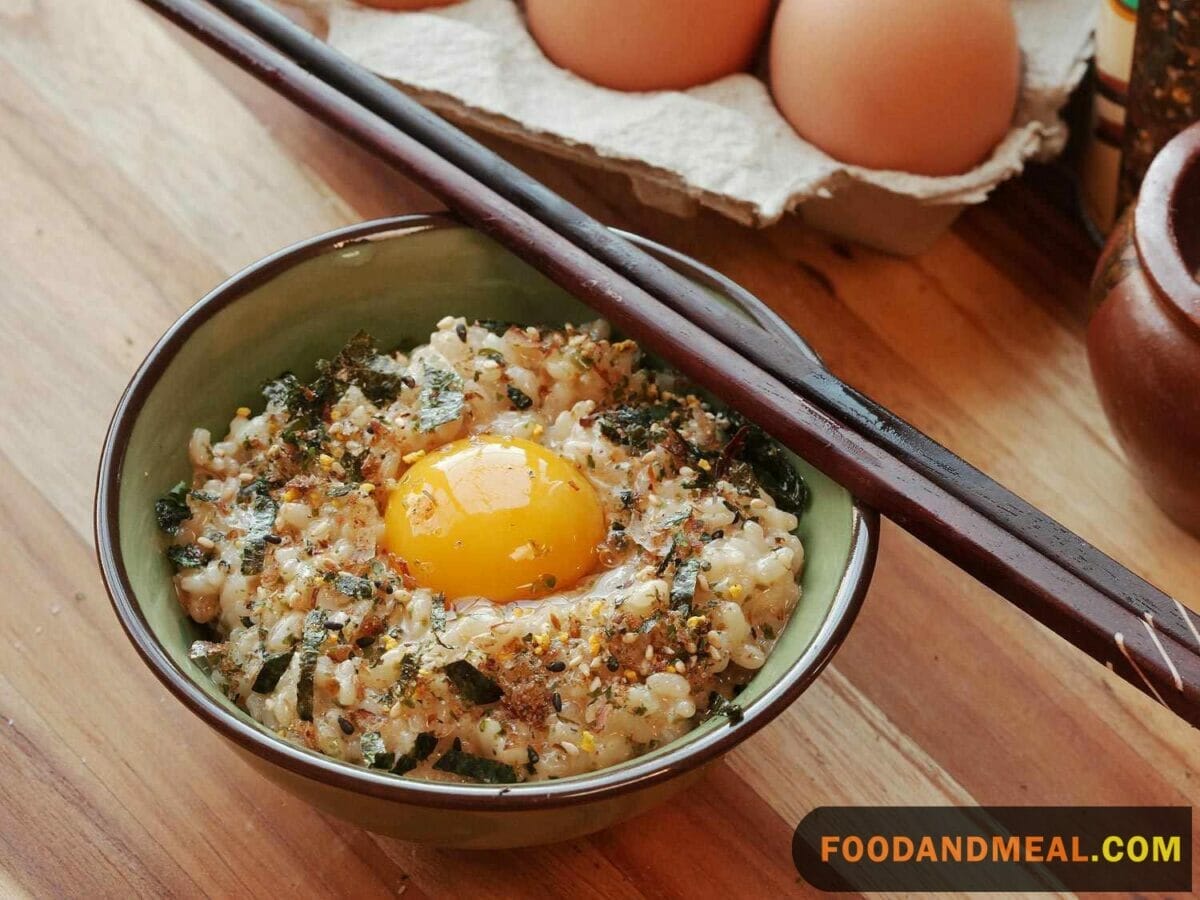The Dashi Eggs on Rice is easy to make and has a very Japanese flavor. The Japanese love this simple meal, and it’s a common treat to find in restaurants. It is very customizable, with different methods for serving it. Some people crack the egg into the rice, while others pour the egg over the rice. Others like to top it with extra vegetables or seasonings. There really is no wrong or right way to serve it.
Dashi Eggs on Rice Recipes


Dashi Eggs
Equipment
Ingredients
Eggs
- 3 large eggs
- ¼ cup chicken stock
- 1 teaspoon caster sugar
- ¼ teaspoon salt
- 1 ½ cup rice cooked, hot
- 1 ½ tablespoons vegetable oil
- 2 tablespoons salmon flakes
- 2 teaspoons aonori dried nori seaweed flakes
Chicken Dashi
- 1 lb. chicken bones 500 g.
- 3 l. water
- 1 oz. bonito flakes 20 g.
Instructions
- Beat the eggs with the salt, sugar, and stock in a large bowl. Add the oil to a pan and place it over medium heat.
- Pour the egg mixture into the pan and cook for a few seconds. Divide the omelet in half and flip to cook until set.
- Divide the rice into two serving bowls.
- Top the rice with one egg piece. Add the salmon flakes and anoroi flakes.
- Prepare the dashi and add the chicken bones and enough water to cover them to a saucepan.
- Cook to a boil and drain. Return the bones to a pan and add more water, then cover to cook for 4 hours on low heat.
- Add the bonito flakes and mix well. Allow the mixture to cool for 15 minutes, then strain. Serve the rice with the dashi. Enjoy.
Video
Notes
Nutrition
© Food And Meal
This website provides approximate nutrition information for convenience and as a courtesy only. Nutrition data is gathered primarily from the Spoonacular Database, whenever available, or otherwise other online calculators.
Alternative Method: Dashi Eggs on Rice Using a Microwave

Ingredients:
- 2 cups cooked rice
- 2 large eggs
- 1 cup Dashi broth
- 1 tablespoon soy sauce
- 1 teaspoon mirin (sweet rice wine)
- 1/4 teaspoon salt
- Nori seaweed strips and sliced scallions for garnish
Instructions:
- Prepare the Rice: Place 2 cups of cooked rice into a microwave-safe bowl. Ensure the rice is evenly spread out in the bowl.
- Prepare the Eggs: In a separate bowl, whisk 2 large eggs until the yolks and whites are well combined.
- Microwave the Eggs: Pour the whisked eggs over the rice in the microwave-safe bowl. Gently mix the eggs and rice, so the eggs coat the rice evenly.
- Microwave on Low: Cover the bowl loosely with a microwave-safe lid or microwave-safe plate. Cook the rice and egg mixture in the microwave on low power (around 30% power) for 3-4 minutes. Cooking on low power ensures the eggs don’t become rubbery.
- Stir and Cook Again: Carefully remove the bowl from the microwave and stir the rice and eggs. Make sure to break up any large chunks of cooked egg. Place it back in the microwave and cook for an additional 2-3 minutes on low power.
- Prepare the Dashi Sauce: While the rice and egg are in the microwave, you can prepare the Dashi sauce. In a microwave-safe container, combine 1 cup of Dashi broth, 1 tablespoon of soy sauce, 1 teaspoon of mirin, and 1/4 teaspoon of salt. Heat the sauce in the microwave for about 1-2 minutes, so it’s warm but not boiling.
- Combine and Garnish: Once the rice and egg mixture is cooked, pour the warm Dashi sauce over it. Garnish with nori seaweed strips and sliced scallions.
- Serve: Your Dashi Eggs on Rice are ready to be enjoyed. Be cautious when removing the bowl from the microwave, as it will be hot.
Tips for making Dashi Eggs on Rice

Cooking Tips
- Use Fresh Eggs: Fresh eggs make all the difference. They produce a clean, tender texture, so always check the expiration date before using them.
- Low and Slow: Whether cooking on the stovetop or in the microwave, low heat is your friend. It prevents the eggs from turning rubbery and ensures a creamy, custard-like consistency.
- Constant Gentle Stirring: During cooking, stir the eggs gently and consistently. This helps create small curds and prevents large chunks of egg from forming.
- Don’t Overcook: Overcooked eggs can become dry. When using the microwave method, keep an eye on the timer. Stop the microwave as soon as the eggs are set but still slightly runny.
- Master the Dashi: Achieving a balance with your Dashi broth is crucial. Taste it as you add soy sauce, mirin, and salt. Adjust the seasoning to your preference.
Serving Suggestions

- Garnishes: Sprinkle some furikake (a Japanese seasoning blend), toasted sesame seeds, or finely chopped chives over your dish for added flavor and texture.
- Pickled Vegetables: A side of pickled vegetables, such as takuan (pickled daikon radish) or gari (pickled ginger), provides a delightful contrast.
- Miso Soup: Enjoy your Dashi Eggs on Rice with a bowl of miso soup. The umami-rich flavors of both dishes complement each other perfectly.
- Tea or Sake: Pair your meal with green tea or a glass of sake for a complete Japanese dining experience.
- Sushi Rolls: Create a fusion meal by serving Dashi Eggs on Rice alongside small sushi rolls filled with your favorite ingredients.
Frequently Asked Questions about Dashi Eggs on Rice

- Can I make Dashi Eggs on Rice in advance for meal prepping? Yes, you can prepare Dashi Eggs on Rice in advance, but we recommend consuming them within 1-2 days. Keep them refrigerated and reheat gently in the microwave.
- 2. What can I substitute for mirin if I can’t find it? You can substitute mirin with a mixture of white wine or sake and a small amount of sugar. This combination will mimic mirin’s sweetness.
- 3. Can I use other types of rice for this dish? Certainly! While Japanese short-grain rice is traditional, you can use other types like jasmine rice or sushi rice. Adjust the cooking method as needed.
- 4. Is Dashi Eggs on Rice suitable for vegetarians? Traditional Dashi broth is made from fish, but you can find vegetarian or vegan Dashi alternatives. Use one of these options to make a vegetarian version.
- 5. What’s the best way to reheat leftovers? To reheat Dashi Eggs on Rice, use the microwave or a gentle stovetop heat. Add a small amount of Dashi or water to maintain the dish’s creaminess.
Elevate your dining experience with Dashi Eggs on Rice. Follow our easy recipe, packed with umami goodness. Subscribe for more culinary adventures.
I'm James F Anderson, a noted sous chef from London and a Le Cordon Bleu alumnus. My career began in a Michelin-starred Parisian eatery, where my blend of classic and contemporary cooking, using seasonal ingredients, earned accolades. Recognized in culinary publications and on cooking shows, I’m committed to mentoring aspiring chefs and delivering memorable dining experiences, marking me as a standout talent in the culinary world.



